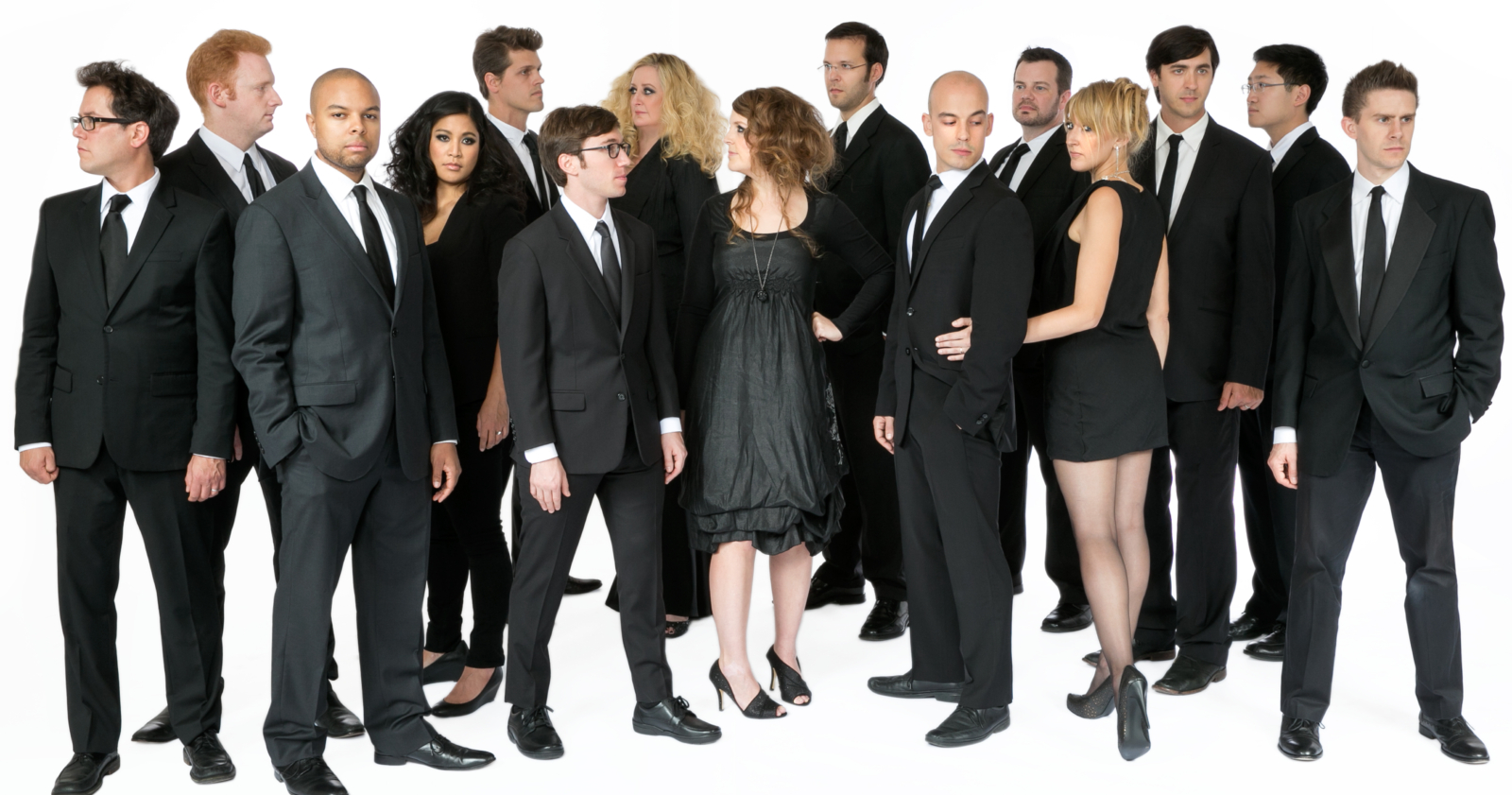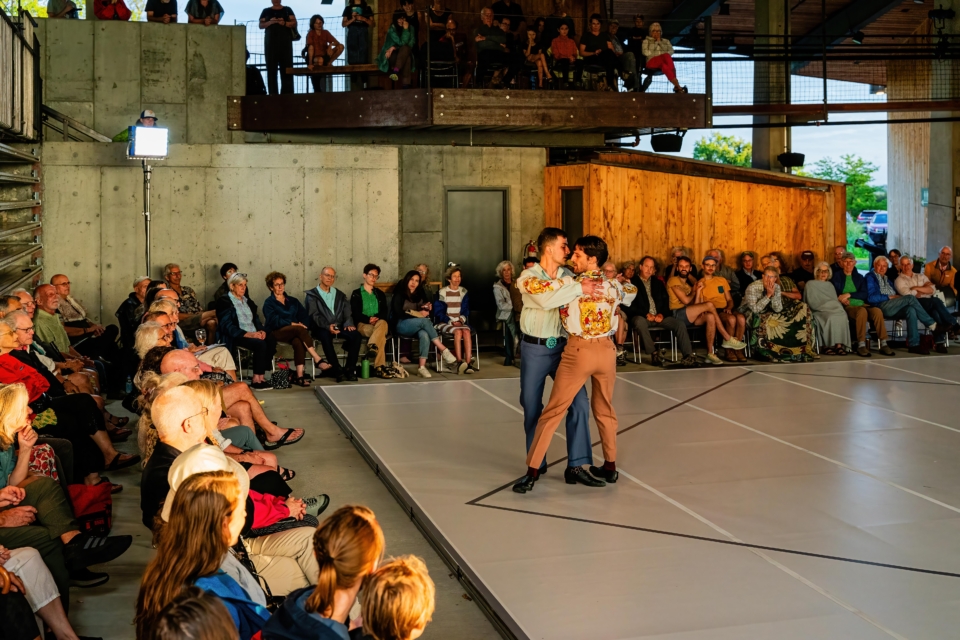
Program
Thursday, December 21, 2023
4:26 PM
PS21 Black Box Theater
Solstices (2018)
Georg Friedrich Haas (b. 1953)
The run-time for Solstices is approximately 75 minutes, and the performance will take place in complete darkness. To give attendees a chance to acclimate to the room, the presentation will begin with a few minutes of darkness in advance of the full performance. Ushers will be equipped with night vision goggles to assist anyone who needs to exit during the performance.
After the performance, there will be a talkback with the artists in the Black Box Theater, followed by a holiday reception in the lobby.
SCHEDULE
3:30 PM Black Box Theater doors open
4:26 PM Doors close. Safety protocol review
4:30 PM Solstices
5:45 PM Holiday reception and post-performance talkback
___________________________________________________
Talea Ensemble
Barry J. Crawford, flute
Marianne Gythfeldt, clarinet
Kevin Fairbairn, trombone
Sae Hashimoto, percussion
Steven Beck, piano
Daniel Lippel, guitar
Karen Kim, violin
Hannah Levinson, viola
Christopher Gross, cello
Greg Chudzik, contrabass
James Baker, rehearsal conductor
Mark Johnson, piano technician
Chris Fisher-Lochhead, moderator
Adrian Morejon, Executive Director
Matthew Gold, Director of Operations
Stephanie Liu, Director of Development & Marketing
Victoria Cheah, Director of Production
___________________________________________________
About Solstices
In spite of its resonances with the rituals of ancient and modern cultures around the world, the title of Georg Friedrich Haas’s Solstices (commissioned by the Riot Ensemble) has a much more private meaning. ‘It is a personal and beautiful coincidence’, he has said. ‘I met my beloved spouse Mollena on 21 December 2013. And we decided to perform a ceremony to sanctify our relationship on 21 June 2014.’ On one level, therefore, Solstices is a love song.
But it is also a piece about intimacy and connection more widely. Apart from its beginning, when the lights fade down and its end, when they come back up again, the whole 70-minute piece is played in complete darkness: darkness so absolute you cannot see your hand in front of your face: no stage lights, no music stand lamps, not even exit signs (and especially no mobile phones!). For the performers the challenge is unique. Their music must be memorised, of course; but they must also depend entirely on their ears to know when to play and when to stop. The living, instinctive bonds they have with each other are paramount. Haas has written several works with passages in complete darkness (although few on this scale), but the music of Solstices is superhumanly complex, a triumph of compositional invention, virtuoso performance, and physical and mental endurance. Yet it is also one of his most delicate works: in between passages of group harmonisation (led by the piano) are many unexpected moments of pure chamber music. Written two years before the COVID-19 pandemic, Solstices is nevertheless an urgent and unforgettable hymn to the necessity of human contact.
Tim Rutherford-Johnson, 2020
Reprinted with permission from the author
Georg Friedrich Haas was born in 1953 in Graz, a city in the east of Austria. His childhood was spent in the mountainous province of Vorarlberg, on the Swiss border. The landscape and the atmosphere of the place have left a lasting impression on his personality. To study music, Haas returned to his native city where his professors were Gösta Neuwirth and Ivan Eröd. Later, he continued his studies in Vienna with Friedrich Cerha.
Light effects, as integral components of a range of his compositions, have featured prominently for quite some time now, designed by artists specially for the music (in vain, 2000, and particularly Hyperion, a Concerto for Light and Orchestra, 2000). However, light as opposed to darkness first emerged as late as 2006 in Sayaka for percussion and accordion as well as in the piano trio Ins Licht (2007) written for Bálint András Varga.
Georg Friedrich Haas is known and respected internationally as a highly sensitive and imaginative researcher into the inner world of sound. Most of his works (with the notable exception of the Violin Concerto, 1998) make use of microtonality which the composer has subjected to thorough examination in the wake of Ivan Wyschnegradsky and Alois Hába. He has taught courses and lectured on the subject in several countries; in 1999 he was invited by the Salzburg Festival to give a talk under the title “Beyond The Twelve Semitones.” In the last paragraph, he writes: “Micro counts as ‘tonality’ only in contrast with ‘normal tonality’ in its role as a system of reference. Where this system of reference has become obsolete, the notion of ‘microtonality’ has been replaced by the free decision of the individual composer in his use of pitch as his material.”
In each new work, Haas enters uncharted territory, but his music is firmly rooted in tradition. His profound admiration for Schubert has found moving expression in his Torso of 1999/2001, an orchestration of the incomplete piano sonata in C major, D 840, an image of the tragic figure of Franz Schubert. Haas paid respect to Mozart not only in his … sodaß ich’s hernach mit einem Blick gleichsam wie ein schönes Bild…im Geist übersehe, composed for string orchestra in 1990/1991, but also in 7 Klangräume, 2005, meant to be interspersed with movements of Mozart’s Requiem fragment. In Blumenstück, 2000, for chorus, bass tuba and string quintet, one hears echoes of Beethoven (perhaps never intended by the composer).
The Cello Concerto, just as Wer, wenn ich schriee, hörte mich… for percussion and ensemble, reflects Haas’s political commitment and his bitter realization of his helplessness as a composer. The percussion concerto was written at the time of the Balkan war; when Haas heard airplanes flying overhead carrying their deadly burden, he asked himself whether anyone could hear him, if he were to cry out in protest against the war. The Cello Concerto begins with a scream in unbearable pain, followed by a section where the drumbeat conjures up the march rhythm of the Prussian army: a plea against fascism.
A daringly innovative composer of rich imaginative power, Georg Friedrich Haas is one of the leading artists in Europe today. Among the prizes he has won are the SWR Symphony Orchestra Composition Prize 2010, the Music Award of the City of Vienna 2012 and the Music Award Salzburg 2013. Since 16 August 2013 he is MacDowell Professor of Music at Columbia University. (Adapted from www.universaledition.com/georg-friedrich-haas-278)
Vermont-based composer/performer Chris Fisher-Lochhead has blazed an idiosyncratic path through the landscape of contemporary music. Working across a broad range of styles and media, he has developed a creative practice which seeks to cultivate open, adventuresome, and playful spaces for musical and social experimentation. He has developed notated compositions in close partnership with some of the world’s most celebrated performers of new music, toured and recorded as an improviser, and participated in cutting-edge interdisciplinary research collaborations. He serves on the faculty of Rensselaer Polytechnic Institute, where he has been proud to work closely with colleagues from the Curtis R. Priem Experimental Media and Performing Arts Center (EMPAC) and the Center for Deep Listening. Learn more at www.cflmusic.com
Heralded as “a crucial part of the New York cultural ecosphere” by the New York Times, the Talea Ensemble’s mission is to champion musical creativity, cultivate curious listeners, and bring visionary new works to life with vibrant performances that remain in the audience’s imagination long after a concert.
Recipients of the Chamber Music America/ASCAP Award for Adventurous Programming, Talea has brought to life at least 50 commissions of major new works since it was founded in 2008. Talea has helped introduce NYC audiences to important works of composers such as Pierre Boulez, Georg Friedrich Haas, Beat Furrer, Olga Neuwirth, Unsuk Chin, and Hans Abrahamsen.
Festival engagements include performances at Lincoln Center Festival, Donaueschingen Musiktage, Internationales Musikinstitut Darmstadt, the Fromm Concerts at Harvard University, Warsaw Autumn Festival, Wien Modern, Vancouver New Music, Time of Music Finland, TIME:SPANS, and many more. The ensemble has also partnered with institutions from across disciplines, such as the Institute of Contemporary Art Boston, the City of Ideas Festival in Mexico, or the Storm King Art Center. Talea’s recordings have been distributed worldwide on the Kairos, Wergo, Gravina Musica, Tzadik, Innova, and New World Records labels, and been broadcast on ORF (Austria), HRF (Germany), and WQXR’s Q2. Talea assumes an ongoing role in supporting a new generation of composers, and has undertaken residencies in music departments around the country.
Talea is a 501(c)3 non-profit organization. The Talea Ensemble’s 2023-24 season projects are supported in part by the Alice M. Ditson Fund, Amphion Foundation, Howard Gilman Foundation, Fan Fox & Leslie R. Samuels Foundation, Ernst von Siemens Musikstiftung, and generous donors like you. Talea’s season is also made possible by the New York State Council on the Arts with the support of the Office of the Governor and the New York State Legislature.
A vibrant center for contemporary performance in the Hudson Valley, PS21 “presents work that challenges and invites” (The New York Times): adventurous productions by leading and emerging American and international artists in music, dance, and theater, and visionaries creating entirely new genres. On our open-air Pavilion Theater stage, across our expansive, unspoiled grounds, and in the diverse surrounding communities, PS21 cultivates and presents productions that transcend aesthetic boundaries and revitalize existing artistic languages and grammars. Throughout the year, we host developmental residencies for dancers, musicians, actors, and creators of original, unclassifiable new work. Rooted in community collaboration, PS21’s programming engages creatively with critical global and social issues. It is a mecca for innovative and original artistic voices, a destination for performance that can be experienced nowhere else in the region.
PS21’s Pavilion Theater is a green-energy marvel surrounded by 100 acres of unspoiled meadows, trails, and woodlands that are a haven to wildlife and visitors across the region. Integrated into our unspoiled campus, the theater embodies our commitments to the public: open, inviting, and optimized for their enjoyment and encouraging citizen expression and participation.
READ MORE ABOUT PS21
PS21 concerts are supported in part by The Aaron Copland Fund for Music and The Alice M. Ditson Fund.










